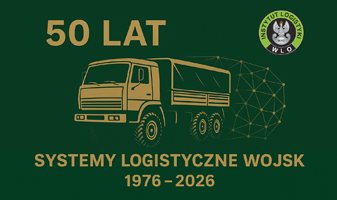ORIGINAL PAPER
Research dilemma of military logistics
1
War Studies University, Faculty of Management and Command, Institute of Logistics, Poland
A - Research concept and design; B - Collection and/or assembly of data; C - Data analysis and interpretation; D - Writing the article; E - Critical revision of the article; F - Final approval of article
Submission date: 2022-06-30
Acceptance date: 2022-09-30
Publication date: 2022-09-30
Corresponding author
Tomasz Jałowiec
Management and Command Faculty, War Studies University, Chruściela 103, 00-910, Warsaw, Polska
Management and Command Faculty, War Studies University, Chruściela 103, 00-910, Warsaw, Polska
SLW 2022;56(1):5-16
KEYWORDS
TOPICS
ABSTRACT
For many years, continuous work has been carried out at the level of theory and practice aimed at sorting out the terminological chaos and defining a transparent, universally acceptable scope of military logistics research. Despite many attempts made by numerous circles conducting scientific research on the problems of modern military logistics, so far it has not been possible to develop the necessary consensus. This state of affairs is most influenced by the interdisciplinary nature of logistics issues in the military sector and the high dynamics of changes taking place in military logistics systems, as well as their environment. Currently, however, many arguments indicate that for the further development of military logistics, it is necessary to undertake extensive research aimed at identifying the scope of its research fields and indicating further research perspectives of military logistics.
The aim of the article is to identify and evaluate the scientific evolution of military logistics and to indicate its further research perspectives in an interdisciplinary formula. The research problem undertaken to be solved has been specified in the following form: what priority research directions should be adopted in the development of military logistics and what affects the improvement of its dimension to the expectations of entities creating the military logistics system? A number of methods were used in the material, among which the leading ones were: analysis and synthesis, querying the literature on the subject, abstraction and inference. As an empirical method, the diagnostic survey method using the expert interview technique was used. The adopted approach made it possible to obtain a cross-cutting nature of the considerations, at the
We process personal data collected when visiting the website. The function of obtaining information about users and their behavior is carried out by voluntarily entered information in forms and saving cookies in end devices. Data, including cookies, are used to provide services, improve the user experience and to analyze the traffic in accordance with the Privacy policy. Data are also collected and processed by Google Analytics tool (more).
You can change cookies settings in your browser. Restricted use of cookies in the browser configuration may affect some functionalities of the website.
You can change cookies settings in your browser. Restricted use of cookies in the browser configuration may affect some functionalities of the website.


